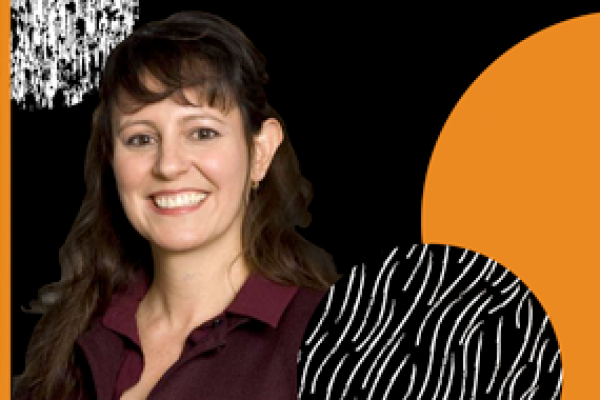Why Cross-Disciplinary Research Matters: An Interview with Michelle Wibbelsman

The following interview of Michelle Wibbelsman was conducted by Global Arts + Humanities Discovery Theme Program Manager, Puja Batra-Wells. Wibbelsman is an associate professor in the Department of Spanish and Portuguese at Ohio State. She specializes in the expressive culture of Indigenous peoples of the Andean highlands; her current research centers on Indigenous transnational migration, diaspora, and cosmopolitanism. Wibbelsman is a lead co-PI for the GAHDT-funded K’acha Willaykuna Andean and Amazonian Indigenous Arts and Humanities Collaboration.
PUJA BATRA-WELLS: Tell us about your current work/project.
MICHELLE WIBBELSMAN: My work broadly centers on Latin American Indigenous cultures. I work primarily with communities in the Andes and Amazonia on topics of expressive culture, performance, ritual practices and political movements. Among the issues that my work engages are those of cultural diversity, continuity and change — especially in contexts of global exchanges and Indigenous transnational migration. I am particularly engaged with exploring and understanding Indigenous worldviews, epistemologies and meaning-making practices and methods. K’acha Willaykuna: Andean and Amazonian Indigenous Arts and Humanities Collaboration, funded by GAHDT, is one of several key forums for exploring these perspectives with colleagues from different disciplinary backgrounds as well as with Indigenous artists and community leaders themselves. In this sense, my work not only engages cross-disciplinary perspectives but also intercultural conversations with particular attention to Indigenous methodologies and practices.
PBW: To what degree are cross-disciplinary perspectives or methods important to your research and scholarship?
MW: My sense is that a comprehensive understanding of Andean and Amazonian cultures — and any culture for that matter — must be informed by cross-disciplinary approaches, given the range of topics and the intertwined relationships among them. Understanding cultural processes through a singular disciplinary lens falls short of appreciating rich intersectionalities and insights that come into view more readily with multifaceted approaches. Cross-disciplinary and inter-cultural exchanges, moreover, give rise to unique combinations of ideas and creative conversations that tend away from strict institutional categories and theoretical silos with unpredictable and often surprising and innovative outcomes much more suited to understanding Indigenous cultures. Finally, cross-disciplinary engagement resonates with Indigenous emphases on de-centering singular narratives in favor of emphatically plural and concertedly dialogical models for theoretical, methodological and analytical development.
PBW: What do you see as the major challenges of doing cross-disciplinary research? What do you find most rewarding?
MW: The biggest challenge of doing cross-disciplinary research is that this takes time. It involves practicing new modes of listening, explaining, interacting, thinking. It is clearly not a one-time or easy involvement, but rather a commitment to an ongoing disposition of openness and willingness to repeatedly step out of our comfort zone. It requires making time to read outside of our discipline. It often also implies shifting roles from presenting as experts to listening — and often practicing intent, radical listening — as we learn to engage with alternative vocabularies, literacies, meaning-making approaches, conceptual frameworks and agendas. These challenges are actually the rewards as well, given that these processes ultimately change us and our research inquiries and approaches in profound ways.
PBW: What ethical considerations drive your interest in issues of Indigenous transnational migration, diaspora and cosmopolitanism?
MW: Representation is a central ethical consideration in my work on Indigenous transnational migration, cosmopolitanism and cultural diversity. This lies at the heart of disrupting reductive ethnic stereotypes and communicating the complexity of Indigenous realities. The role of outside researcher itself raises questions not only about what we say and write about Indigenous communities, but the fact that we speak for others at all. In this sense, I have found collaborative work with Indigenous communities both more productive and sensitive to power dynamics regarding who speaks for whom. An insistence on actively moving away from talking about, teaching about Indigenous cultures in our research and our teaching and toward engaging with Indigenous epistemologies instead is also an ethical consideration and commitment in my work. This challenge is particularly salient in relation to my role as faculty curator of the Andean and Amazonian Indigenous Art and Cultural Artifacts Collection and the issues of collection, cataloguing and representation that emerge in that curatorial context.
PBW: Is decolonialization an effective framework for social change?
MW: From my perspective, decolonial frameworks present a particularly useful incubator for conceiving of and also rehearsing social and cultural change because they very explicitly draw attention to problematizing institutional practices, decentering Western methodologies and inviting alternative perspectives and approaches. Most importantly, decolonial practices invite broader dialogue within our universities but especially beyond our institutions.
PBW: In one sentence, what is the value of cross-disciplinary research in your field?
MW: From my perspective, the value of cross-disciplinary research is that it encourages openness, exchange, dialogue, collaboration and breaks us out of singular models of listening and analysis, giving way to emergent, novel and creative theoretical and methodological possibilities.
